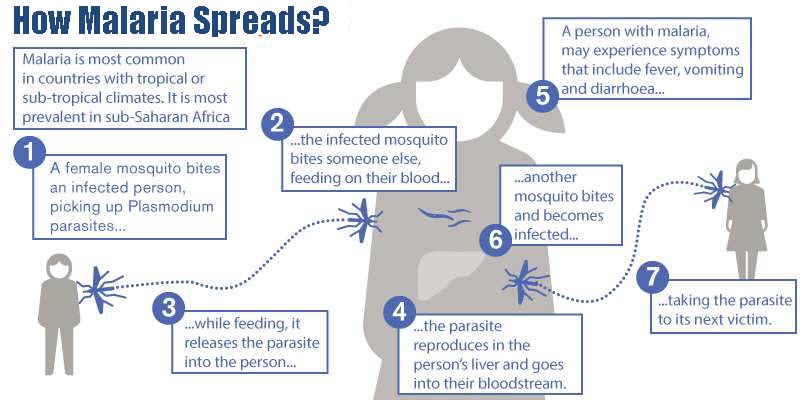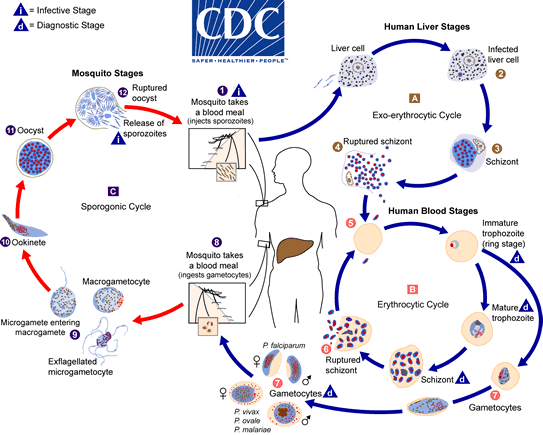Have you read our earlier post on Malaria, if not then go ahead and read so that you will come to know about the basics of Malaria and how it occurs.
Here we will discuss two important topics related to Malaria, one is “How Malaria Spreads from Person to Person” and the second one is “How Malaria Affects the Human Body“.
Let’s start with our First topic i.e., related to Spreading of Malaria.

Step 1: A female Anopheles mosquito bites an Infected person (He/She is already infected with Malaria i.e., Plasmodium). During its feeding, Plasmodium parasites enters into mosquito. Now, the mosquito acts as carrier of Plasmodium protozoan parasites.
Step 2: Now the Infected Mosquito (Plasmodium Carrier) bites some other Healthy person and feeds on (sucks) their Blood.
Step 3: During feeding, the Plasmodium parasites are transmitted into the Human Blood along with mosquito saliva.
Step 4: The Plasmodium parasite that entered into Human Blood will reach the liver cells and get reproduced there and multiply in number. From liver cells, the multiplied parasites get circulated into the bloodstream. The parasites now starts attacking the Red Blood Cells (RBCs).
Step 5: The symptoms of malaria begins to appear in the person usually after 10 to 14 days of Infection. The symptoms include Nausea, Vomiting, Chills, Fever, Headache and Body Pains.
Step 6: Another Healthy Mosquito feeds on the Blood of the Infected Person. The parasites now enter into the stomach of mosquito through Blood. The healthy mosquito now becomes the carrier of Plasmodium parasites.
Step 7: If the same mosquito bites another Healthy person, the result is transmission of Plasmodium parasites from mosquito to that person.
In this way, Malaria spreads from person to person by means of a vector i.e., Female Anopheles Mosquitoes.
Now the second topic is “How Malaria Affects the Body“
After being bitten by Infected Mosquito, the person won’t show any symptoms for 10 days to 1 month. During this time period, Plasmodium parasites replicates in the Liver cells before invading Red Blood Cells in the Bloodstream.
After multiplication, the parasites soon attacks the Red Blood Cells and continue to spread the Infection. Now the RBCs get ruptured due to parasites, which ultimately leads to Flu-like symptoms including Fever, Chills, Sweating and Nausea.
As the disease progresses, parasites attack the spleen too, thus both liver and spleen get enlarged. Malaria infection also leads to Anaemia and Jaundice.
In severe cases, the malarial parasite even attacks the brain and causes neurological problems which ultimately leads to Coma and Death.
Complete Life-Cycle of Plasmodium Parasite (Both in Mosquito and Human):

The malaria parasite life cycle involves two hosts. During a blood meal, a malaria-infected female Anopheles mosquito inoculates sporozoites into the human host  . Sporozoites infect liver cells
. Sporozoites infect liver cells  and mature into schizonts
and mature into schizonts  , which rupture and release merozoites
, which rupture and release merozoites  . (Of note, in P. vivax and P. ovale a dormant stage [hypnozoites] can persist in the liver and cause relapses by invading the bloodstream weeks, or even years later.) After this initial replication in the liver (exo-erythrocytic schizogony
. (Of note, in P. vivax and P. ovale a dormant stage [hypnozoites] can persist in the liver and cause relapses by invading the bloodstream weeks, or even years later.) After this initial replication in the liver (exo-erythrocytic schizogony  ), the parasites undergo asexual multiplication in the erythrocytes (erythrocytic schizogony
), the parasites undergo asexual multiplication in the erythrocytes (erythrocytic schizogony  ). Merozoites infect red blood cells
). Merozoites infect red blood cells  . The ring stage trophozoites mature into schizonts, which rupture releasing merozoites . Some parasites differentiate into sexual erythrocytic stages (gametocytes)
. The ring stage trophozoites mature into schizonts, which rupture releasing merozoites . Some parasites differentiate into sexual erythrocytic stages (gametocytes)  . Blood stage parasites are responsible for the clinical manifestations of the disease.
. Blood stage parasites are responsible for the clinical manifestations of the disease.
The gametocytes, male (microgametocytes) and female (macrogametocytes), are ingested by an Anopheles mosquito during a blood meal  . The parasites’ multiplication in the mosquito is known as the sporogonic cycle
. The parasites’ multiplication in the mosquito is known as the sporogonic cycle  . While in the mosquito’s stomach, the microgametes penetrate the macrogametes generating zygotes
. While in the mosquito’s stomach, the microgametes penetrate the macrogametes generating zygotes  . The zygotes in turn become motile and elongated (ookinetes)
. The zygotes in turn become motile and elongated (ookinetes)  which invade the midgut wall of the mosquito where they develop into oocysts
which invade the midgut wall of the mosquito where they develop into oocysts  . The oocysts grow, rupture, and release sporozoites
. The oocysts grow, rupture, and release sporozoites  , which make their way to the mosquito’s salivary glands. Inoculation of the sporozoites
, which make their way to the mosquito’s salivary glands. Inoculation of the sporozoites  into a new human host perpetuates the malaria life cycle.
into a new human host perpetuates the malaria life cycle.



One thought on “How Malaria Spreads and Affects the Human Body?”